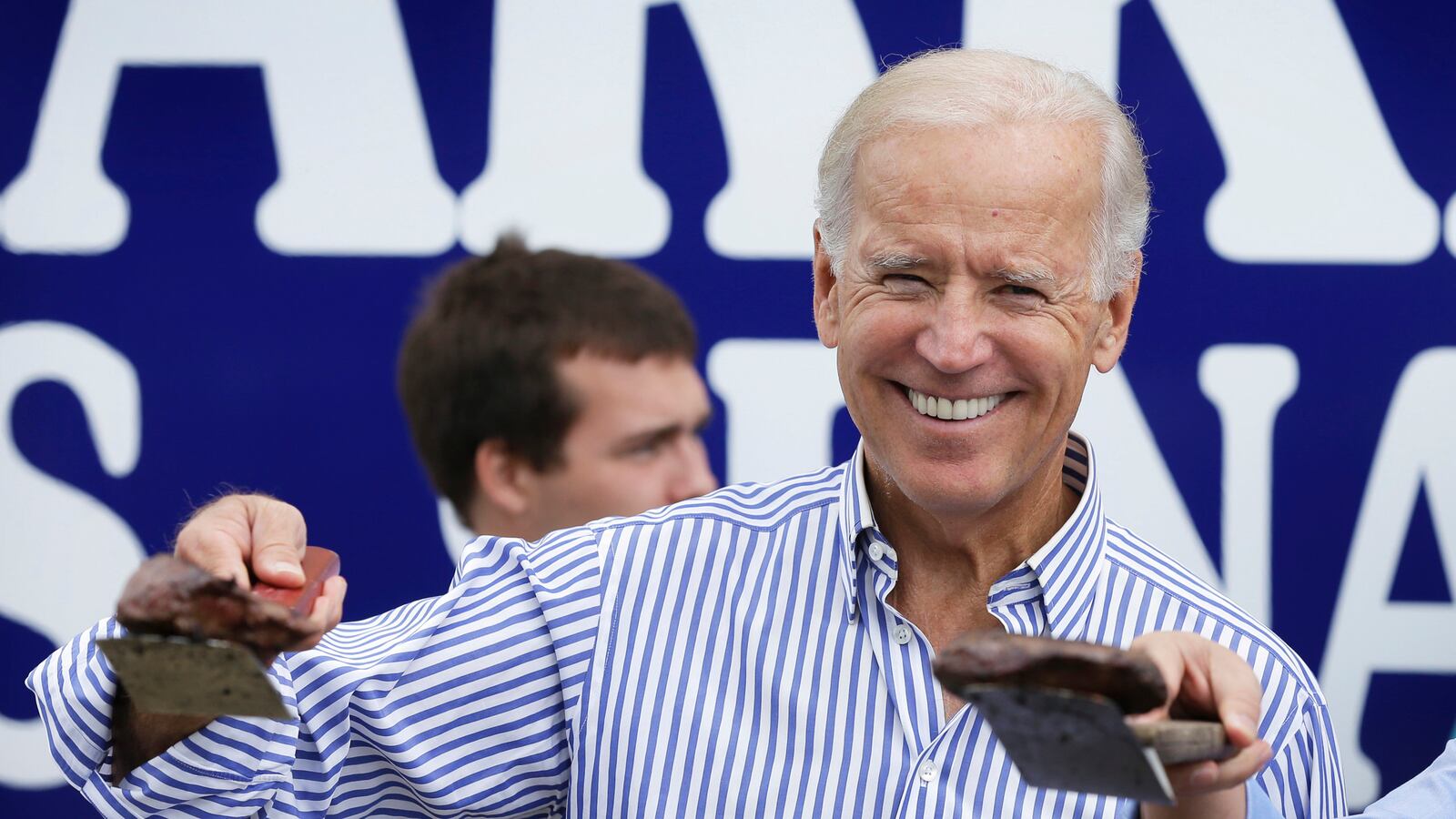INDIANOLA, IOWA — “It’s amazing,” Joe Biden joked. “When you come to speak at the steak fry, a whole lot of people seem to take notice. I don’t know why the hell that is.”

Really, Joe?
Standing before a giant American flag on a stage adorned with hay bales and pumpkins at an annual Democratic fundraiser, the vice president’s Sunday swing through Iowa raised immediate flashbacks of the 2008 presidential primaries—in which Biden got trounced by his future boss and Hillary Clinton—as well as fevered speculation about the veep’s 2016 plans.
But Biden didn’t bite. Instead, he spent the majority of his chat heralding the retiring Iowa Sen. Tom Harkin and touting the domestic achievements of the Obama administration. He didn’t have to mention at all the political significance of his presence in the first-in-the-nation caucus state that kicks off the presidential primary process.
Still, it’s conventional wisdom that Biden is leaving another run in 2016 on the table, and he could benefit from deep roots in the Hawkeye State. Harkin said he’s one of the few out-of-state politicians who has been through all 99 counties multiple times. Even so, he placed a humbling fifth behind Bill Richardson in the 2008 caucuses, and early polling shows Hillary Clinton trouncing him by double digits in a hypothetical 2016 match-up.
The way voters here punished Clinton for her unapologetic support for the Iraq war five years ago must be etched into the vice president’s mind.
It also may explain why there was no saber rattling on Syria on Sunday.
After listening to his speech here in Indianola, a war in the Middle East that appeared imminent just a week ago seemed almost like a faded memory. Instead, the vice president’s comments on the Syrian crisis were almost entirely dedicated to diplomacy.
“We’re going to the United Nations with a resolution this week that will, in fact, call on the United Nations and the world to put pressure on Syria to have the confiscation and destruction of all those weapons,” Biden told a hushed audience at the tail end of a 40-minute address on an overcast day here with thunder rumbling in the distance.
Just five days prior, President Obama took to the airways to warn the nation he would move forward with a military strike if a Russian proposal to secure Syria’s chemical weapons failed.
Biden carried no such stark warning.
“I think John Kerry has been one of the best secretaries of State so far in history of the United States of America,” he said, referring to the news of an agreement with the Russians over how to rid Syria of its chemical weapons.
In the four minutes Biden devoted to Syria, that’s the only line that earned any applause.
After all, many of the Democrats who came to these fairgrounds 20 miles south of Des Moines were among the first to propel Obama’s anti-war candidacy in 2008. Polls show a majority of Democrats are opposed to intervening in the civil war. Many harbor deep reservations about the degree of impact of a strike and are fearful of a longer-term entanglement in a hostile region.
Even Harkin, who heaped piles of praise on Biden in his introduction, has himself said he’s likely to vote against military action.
But the weekend development allowed the senator to highlight party unity on the diplomatic path.
“We reached this agreement with the international community to secure them and dismantle them by 2014, and we didn’t lose one American life. That’s leadership folks,” he said to cheers.
Due to the ongoing developments in Syria, there was even some speculation that Biden might end up scrapping his appearance at this hallmark partisan political event. But merely showing up and talking up the diplomatic gains underscored how drastically the conversation on Syria has shifted in just a week.
“Obviously every president reserves the right to act alone if American interests are at stake,” Biden said in his only veiled reference to a potential bombing campaign. “But we know, he knows, we’re much stronger when we work in concert with our allies and the international community.”
The irony of the moment wasn’t lost on Biden.
In 2007, presidential candidate Joe Biden stood on the very same steak fry stage and promised an end to the enduring wars in Iraq and Afghanistan. Six years later, and now vice president, he found himself finessing the Obama administration’s foreign policy argument as it contemplates war on a new front.
But Biden took about as much time to address successes in Iraq and Afghanistan as he did to talk about the future of Syria.
“We told you at this steak fry in 2007, at opposite ends of the platform, but he and I said the exact same thing coincidentally. We said the first order of business if either of us were elected would be to end the war in Iraq. And we did. We ended the war in Iraq,” he said to applause. “We promised you we would end the war in Afghanistan and I guarantee you, we will end the war in Afghanistan.”
Ted Kaufman, a former U.S. senator and longtime adviser to Biden, asserted that those who rush to toss broad-brush labels on politicians as hawks or doves usually glaze over the complexities of foreign policy.
In 1993, Biden was one of the key leaders to call for U.S. intervention in the Balkans but two years earlier opposed the first Gulf War.
Comparing Iraq and Afghanistan with Syria is apples and oranges, Kaufman argued.
“There’s a big difference between the war in Afghanistan and the war in Iraq than saying we’re sending some cruise missiles into a very limited straight into Syria,” he said. “I don’t think there’s any irony or inconsistency on Joe’s part.”
Carrying another presidential run in the back of his mind, the vice president doesn’t have the luxury of sketching out his own foreign policy at the moment. He is essentially a salesman for Obama’s worldview.
But just like any savvy politician, he can finely tune a message to fit the audience.
And the message he hoped to convey Sunday may be best summed up in the seven words he used to respond to a reporter’s question on Syria: “I think we’re going to be OK.”






